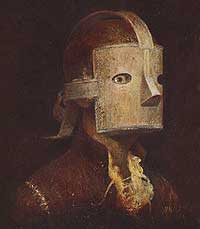Something will come of Nothing
 If you are one of those people who regularly scans the “new fiction†shelves, or habitually reads the New York Times Book Review (a habit increasingly robbed of gratification), you may have noticed the alarming number of novels devoted to historical subjects. To my mind, there are entirely too many works of historical fiction out there, and I include in that gross denunciation not just “literary†fiction—or what espouses inclusion in that category—but also the mounting number of mysteries with ancient detectives, medieval detectives, nineteenth-century New York detectives, and a profusion of World War I detectives, not to mention the numerous “alternative†histories to be found under the science fiction/fantasy rubric (too many of which are fond of refighting the Civil War, with you-know-who the victors [they don’t call it “The Lost Cause†for nothing!]). As one who has dabbled in historical fiction, I am all too aware of the hazards of imaginatively capturing the past, and I hasten to add that there are truly great novels—old and new—out there. And among them are books that usually don’t grab our attention because they are marketed as “young adult†novels.
If you are one of those people who regularly scans the “new fiction†shelves, or habitually reads the New York Times Book Review (a habit increasingly robbed of gratification), you may have noticed the alarming number of novels devoted to historical subjects. To my mind, there are entirely too many works of historical fiction out there, and I include in that gross denunciation not just “literary†fiction—or what espouses inclusion in that category—but also the mounting number of mysteries with ancient detectives, medieval detectives, nineteenth-century New York detectives, and a profusion of World War I detectives, not to mention the numerous “alternative†histories to be found under the science fiction/fantasy rubric (too many of which are fond of refighting the Civil War, with you-know-who the victors [they don’t call it “The Lost Cause†for nothing!]). As one who has dabbled in historical fiction, I am all too aware of the hazards of imaginatively capturing the past, and I hasten to add that there are truly great novels—old and new—out there. And among them are books that usually don’t grab our attention because they are marketed as “young adult†novels.
This oversight is not new. Back in the 1980s, when my children were, well, children, I immersed myself in children’s and young adult history books, fiction and nonfiction, as a parental project and to write an assessment of the field for the Radical History Review. The article went on to be revised and expanded for the pioneering 1986 anthology Presenting the Past: Essays on History and the Public, edited by my friends Susan Porter Benson, Steve Brier, and Roy Rosenzweig (and, amazingly, still in print by Temple University Press). What struck me back then, and continues to be true more than (gulp) 28 years later, is that, amid the expected dross, there were some truly amazing works of imaginative young-adult historical fiction that put novels in the adult category to shame. Among them was Jill Paton Walsh’s 1978 A Chance Child, a time-travel novel that remains, for me, one of the most evocative and troubling visions of child labor in England under early industrial capitalism.
I am ashamed to say that it has taken me three years to catch up with the 2006 young-adult novel The Astonishing Life of Octavian Nothing, Traitor to the Nation, Volume 1: The Pox Party by M. T. Anderson. With the exception of William Boyd’s 2003 epistolary Any Human Heart, Octavian Nothing is by far the most original and compelling work of historical fiction I have read in years. I’m hesitant to say much about the plot because its bildungsroman structure is one of traumatic discovery for both its protagonist and its reader. But let me provide two tantalizing quotes, the first from the Library of Congress catalog summary: “Various diaries, letters, and other manuscripts chronicle the experience of Octavian, from birth to age sixteen, as he is brought up as part of a science experiment in the years leading up to and during the Revolutionary War.†The second is from an interview with the author: “. . . I decided to write a book from the point of view of someone who wouldn’t know the outcome of the [revolutionary] war and who had to make a hard choice between sides. I wanted to recapture the feeling of the unknown, the unclarity of that decision.â€
Written with a pitch-perfect ear to the language and cadences of eighteenth-century Massachusetts, this novel is a stylistic triumph and a brilliant contemplation about race and revolution. I’m going to refrain from saying anything else—and suggest you avoid consulting any reviews or more comprehensive summaries until you read this book (you may have noticed I didn’t supply a link with the title: you’ll thank me). I’ll just close with the confession that, having just finished the book this morning, I’m going out right now to buy the newly-published second volume, The Kingdom on the Waves.
Last 5 posts by Josh Brown
- The Civil War Draft Riots at 150 – A Public Event - June 17th, 2013
- Alfred F. Young - November 7th, 2012


